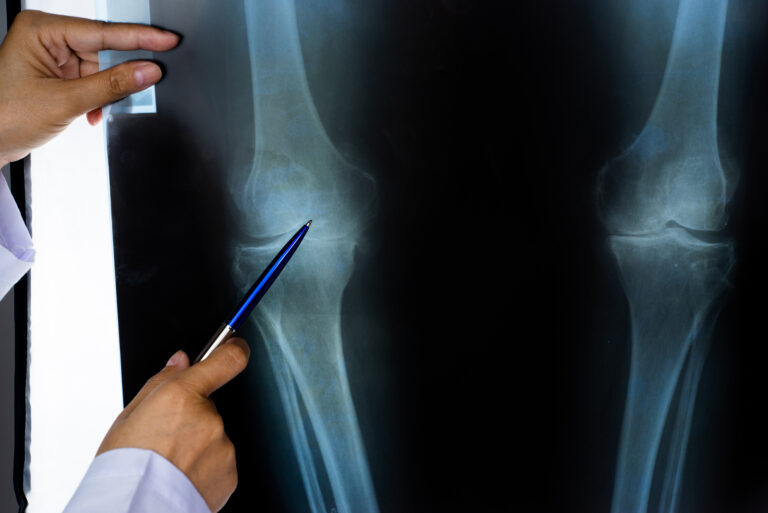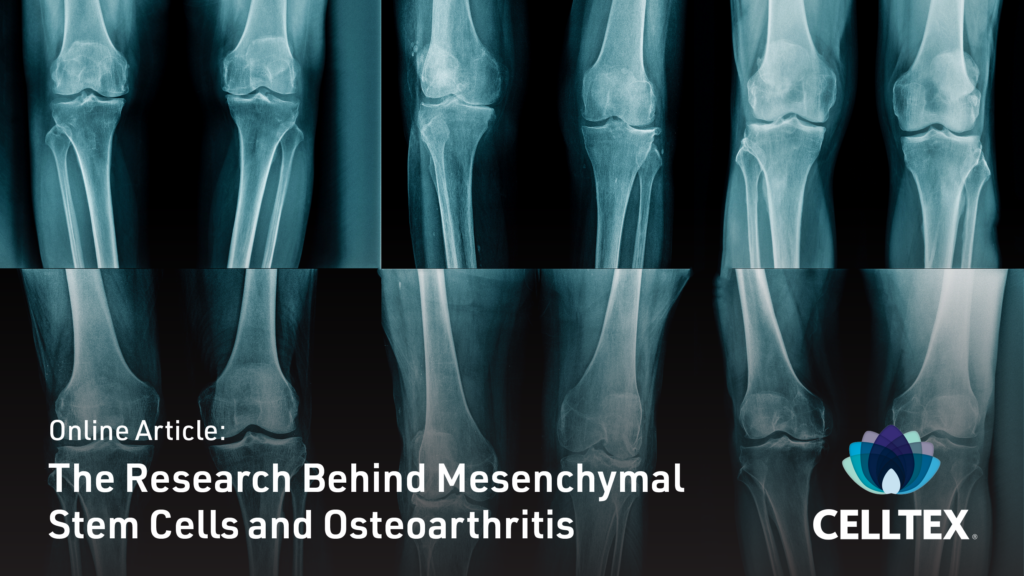Celltex News
Examining Research: Impact of Stem Cell Therapy on Osteoarthritis Symptoms and Radiology

Due to their versatility, Mesenchymal Stem Cells (MSCs) stand out from other stem cells and are widely used in regenerative medicine. While MSCs have the differentiation capabilities often associated with stem cells, their unique ability to help regulate the immune system, particularly in combating inflammation and joint pain, puts them at the forefront of osteoarthritis research.
Numerous studies have demonstrated the positive impact of MSC-based therapies on conditions such as osteoarthritis (OA), with many more on the horizon.
This article examines osteoarthritis and discusses the anti-inflammatory properties of MSCs which have made them highly promising in osteoarthritis treatment. We also reveal studies highlighting radiology improvements following MSC therapy and how MSCs can alleviate the painful symptoms of osteoarthritis.
But first, let’s talk about osteoarthritis.
What Is Osteoarthritis?
Arthritis is a term used to describe a group of diseases that impact joints and joint function. Arthritis is typically divided into two major types, inflammatory arthritis and osteoarthritis, according to the primary cause of the disease. Inflammatory arthritis occurs when autoimmune dysfunction causes joint damage in the patient. Osteoarthritis—the most common form of arthritis—is joint damage caused by degeneration, or wear and tear over time. While osteoarthritis was traditionally considered solely a degenerative disease, recent research has established that OA is in fact an inflammatory condition with inflammation playing a substantial role in the disease process.
Unfortunately, the damage caused by osteoarthritis cannot be reversed. Conventional treatments, such as pain medications and cortisone injections, attempt to mitigate symptoms and reduce joint pain, but the OA-afflicted joint still may deteriorate to the point that replacement surgery becomes unavoidable. This highlights the need for alternative methods of care that are less invasive and can do more to mitigate symptoms and progression.
With an abundant amount of scientific literature already pointing to the efficacy of MSCs for OA, MSC therapy has emerged as one of the most promising potential avenues for addressing osteoarthritis symptoms and improving the quality of life of those affected.
Mesenchymal Stem Cells and Osteoarthritis: Promising Outcomes
MSC therapy has potential for helping those with osteoarthritis maintain function and mobility. Mesenchymal stem cells have been shown to be successful in resurfacing degenerated cartilage, leading to pain reduction and cartilage protection [1]. In addition to this regenerative capability, MSCs possess a powerful ability to regulate certain cells within the body, which is why they’re known by some as “Master Signaling Cells.” MSCs can be a potent tool for fighting inflammation, as they can modulate the appearance and activation of specific immune cells responsible for inflammation. MSCs release a myriad of secreted molecules, including cytokines (small proteins that control immune cell activity), that can influence the immune activity and inflammation at arthritic joint(s). This action can be beneficial for alleviating debilitating joint pain commonly associated with osteoarthritis. For a more detailed explanation of this process, you can view our 2023 webinar on MSCs and joint pain.
Considering the anti-inflammatory effects of MSCs, let’s dive into the extensive research highlighting their potential for addressing the symptoms of osteoarthritis.
Exploring the Research: Osteoarthritis and Radiology Improvements Following MSC Therapy
Overall, what does the research say about MSC therapy? The treatment is safe and likely effective for osteoarthritis cases. Multiple published studies and Celltex internal data have established the safety profile of MSC therapy: MSC therapy is well-tolerated by patients with minimal adverse reactions.
Several studies also use radiological evidence to confirm these outcomes. Case in point, a pilot study was conducted to assess the feasibility and safety of MSC therapy in patients diagnosed with lumbar disc degeneration [2]. Patients were followed for one year following MSC therapy to monitor drug safety, the patient’s health status, and various quality of life measurements including the persistence/severity of back pain and the presence of any disability. Magnetic resonance imaging (MRI) measurements of disc height and fluid content were performed to provide a clinically relevant outcome measurement. The results indicated that MSC therapy may be a valid alternative treatment for chronic back pain caused by degenerative disc disease.
Findings revealed:
- Patients exhibited rapid improvement of pain and disability (85% of maximum in 3 months) that approached 71% of optimal efficacy. MRI imaging also revealed that water content was significantly elevated at 12 months [2].
- In two separate studies evaluating MSC therapy in patients with osteoarthritis of the knee, MSC therapy was shown to be safe with clinically relevant benefits.
- An initial 1-year pilot study demonstrated that MSC therapy was well-tolerated by patients and provided relief of the clinical symptoms of osteoarthritis [2].
- A 2-year follow-up of these same patients reaffirmed the conclusions from the first-year results on the feasibility and safety of MSC treatment-namely that the therapy had minimal side effects (none serious) and provided clinical benefit [3].
Clinicaltrials.gov is an online repository for the voluntary submission and updating of upcoming, in-progress, and completed clinical trials. As such, information from a number of completed clinical trials investigating the use of MSC therapy for osteoarthritis is available on the website. Several of these studies demonstrated positive results in terms of pain reduction, symptom improvement, and even cartilage regeneration in study participants as reviewed in Wang et al [4].
Below are summaries of findings from some completed clinical research studies that have been published:
- One randomized control study assessed the feasibility and safety of treating OA of the knee with MSCs. Patients with chronic knee pain unresponsive to conservative treatments and quantitative radiological evidence of osteoarthritis were randomized into 2 groups of 15 patients. One group received intra-articular injections of MSCs while the other received intra-articular injections of hyaluronic acid. MRI scans revealed that the MSC-treated patients displayed “significant improvement in cartilage quality” [5].
- Lamo-Espinosa, J.M. et al. used X-ray and magnetic resonance imaging to examine joint damage in OA patients randomized into 2 groups. One group received intra-articular injections of MSCs with hyaluronic acid while the other received intra-articular injections of hyaluronic acid alone. The authors found that the MSC therapy was safe and further resulted in both “clinical and functional improvements of knee OA” [6].
- Another study demonstrated that MSC therapy “significantly improved knee cartilage thickness [as measured by MRI], thus indicating that [MSC therapy] may enhance the functional outcome and structural component” [7].
- Zhao et al. used multimodal MRI techniques and clinical outcomes to evaluate the potential of MSC therapy to promote repair of cartilage in patients with knee OA. While the primary goal of this study was to demonstrate that multimodal MRI is an appropriate diagnostic tool to monitor and evaluate OA disease progression, the results did demonstrate compositional changes in the cartilage that comported with the alleviation of symptoms following MSC therapy [8].
- In a double-blinded, randomized controlled, phase IIb clinical trial for patients with knee OA, participants treated with MSCs had functional improvement and pain relief at six months post-treatment [9]. Importantly, there were no adverse events reported and, while cartilage defects progressed in the control group as evaluated by MRI, no significant changes in cartilage were observed in the MSC therapy group. This suggests that the MSC therapy at least halted disease progression in the OA patients.
- Lu et al. performed a double-blinded, randomized controlled trial to compare intra-articular injection of hyaluronic acid with intra-articular injection of MSCs in patients with knee OA. Significant improvements in joint function, pain, quality of life, and cartilage regeneration were observed in the patients treated with MSC therapy [10].
Celltex’s Client Reported Outcomes:
Shifting gears, let us look at some of the results Celltex has seen from our clients with osteoarthritis.
The data below is based on two studies conducted by the Celltex Research & Development Team, one for osteoarthritis of the knee and another for osteoarthritis of the shoulder.
Osteoarthritis of the shoulder:
- 55% of physicians noted improvement in Celltex clients with osteoarthritis of the shoulder compared to previous radiology.
- 83% of Celltex clients with osteoarthritis of the shoulder reported improvement in one or more symptoms.
- 55% of Celltex clients with osteoarthritis of the shoulder felt their need for pain medication had decreased.
Osteoarthritis of the knee:
- 81% of Celltex clients with osteoarthritis of the knee reported improvement in one or more symptoms.
- 57% of Celltex clients with osteoarthritis of the knee felt their need for pain medication had decreased.
- 68% of Celltex clients with osteoarthritis of the knee demonstrated clinically important improvements in their quality of life.

Concluding Thoughts: More Research is Needed
Osteoarthritis is a significant research focus for MSC application, with promising results. Yet, there is still much more research to be done.
Clinicaltrials.gov lists several completed and active clinical trials investigating the use of MSCs for osteoarthritis. However, for all the exciting research discussed today, there is far more on the horizon.

Learn More About Celltex
Founded by entrepreneur David G. Eller and world-renowned spine surgeon Dr. Stanley C. Jones, Celltex is able to isolate, expand, and cryopreserve your own adipose-derived MSCs. Celltex-cultured MSCs have been used in over 10,000 stem cell therapies with no severe adverse events.
Interested in learning more about Celltex Adult Stem Cell Banking? Request a virtual brochure, watch our educational webinars, or contact us directly.
If you’re in the Houston area, you can schedule a tour of our lab in person or tour it virtually.
References:
- Djouad F., Bouffi C., Ghannam S., Noёl D., Jorgensen C. (2009). Mesenchymal stem cells: Innovative therapeutic tools for rheumatic diseases. Nat. Rev. Rheumatol. 5, 392–399. DOI:10.1038/nrrheum.2009.104.
- Orozco, L., Soler, R., Morera, C., Alberca, M., Sánchez, A., & García-Sancho, J. (2011). Intervertebral disc repair by autologous mesenchymal bone marrow cells: a pilot study. Transplantation, 92(7), 822–828. https://doi.org/10.1097/TP.0b013e3182298a15
- Orozco L., Munar A., Soler R., Alberca M., Soler F., Huguet M., Sentís J., Sánchez A., García-Sancho J. (2014). Treatment of knee osteoarthritis with autologous mesenchymal stem cells: two-year follow-up results. Transplantation. 97(11), e66-8. DOI:10.1097/TP.0000000000000167.
- Wang LT., Ting CH., Yen ML., Liu KJ., Sytwu HK., Wu K. K., Yen B. L (2016). Human mesenchymal stem cells (MSCs) for treatment towards immune- and inflammation-mediated diseases: review of current clinical trials. J Biomed Sci. 23, 76. https://doi.org/10.1186/s12929-016-0289-5.
- Vega, A., Martín-Ferrero, M. A., Del Canto, F., Alberca, M., García, V., Munar, A., Orozco, L., Soler, R., Fuertes, J. J., Huguet, M., Sánchez, A., & García-Sancho, J. (2015). Treatment of Knee Osteoarthritis With Allogeneic Bone Marrow Mesenchymal Stem Cells: A Randomized Controlled Trial. Transplantation, 99(8), 1681–1690. https://doi.org/10.1097/TP.0000000000000678
- Lamo-Espinosa, J.M., Mora, G., Blanco, J.F., Granero-Moltó, F., Nuñez-Córdoba. J.M., Sánchez-Echenique, C., Bondía, J.M., Dámaso Aquerreta, J., Andreu, E.J., Ornilla, E, Villarón, E.M, Valentí-Azcárate, A., Sánchez-Guijo, F., Consuelo del Cañizo, M., Valentí-Nin, J. R., Prósper, F. et al. (2016). Intra-articular injection of two different doses of autologous bone marrow mesenchymal stem cells versus hyaluronic acid in the treatment of knee osteoarthritis: multicenter randomized controlled clinical trial (phase I/II). J Transl Med. 14, 246. https://doi.org/10.1186/s12967-016-0998-2.
- Al-Najar M, Khalil H, Al-Ajlouni J, Al-Antary E, Hamdan M, Rahmeh R, Alhattab D, Samara O, Yasin M, Abdullah AA, Al-Jabbari E, Hmaid D, Jafar H, Awidi A. (2017). Intra-articular injection of expanded autologous bone marrow mesenchymal cells in moderate and severe knee osteoarthritis is safe: a phase I/II study. J Orthop Surg Res. 12(1),190. DOI:10.1186/s13018-017-0689-6.
- Zhao, X., Ruan, J., Tang, H., Li, J., Shi, Y., Li, M., Li, S., Xu, C., Lu, Q., Dai, C. (2019). Multi-compositional MRI evaluation of repair cartilage in knee osteoarthritis with treatment of allogeneic human adipose-derived mesenchymal progenitor cells. Stem Cell Res Ther. 10, 308. https://doi.org/10.1186/s13287-019-1406-7
- Woo-Suk Lee, Hwan Jin Kim, Kang-Il Kim, Gi Beom Kim, Wook Jin, (2019). Intra-articular injection of autologous adipose tissue-derived mesenchymal stem cells for the treatment of knee osteoarthritis: A phase IIb, randomized, placebo-controlled clinical trial. Stem Cells Translational Medicine. 8(6), 504–511. https://doi.org/10.1002/sctm.18-0122.
- Lu L., Dai C., Zhang Z., Du H., Li S., Ye P., Fu Q., Zhang L., Wu X., Dong Y., Song Y., Zhao D., Pang Y., Bao C.(2019). Treatment of knee osteoarthritis with intra-articular injection of autologous adipose-derived mesenchymal progenitor cells: a prospective, randomized, double-blind, active-controlled, phase IIb clinical trial. Stem Cell Res Ther. 10(1), 143. doi: 10.1186/s13287-019-1248-3. PMID: 31113476
About Celltex
Celltex Therapeutics Corporation is an international leader in cryopreservation, or banking, and culturing of autologous, adipose-derived Mesenchymal Stem Cells (MSCs) for therapeutic use and has remained committed to improving and maintaining clients’ quality of life. Celltex has the unique ability to do what no one else can: isolate, expand and cryopreserve your own MSCs to create your master cell bank, all from one small sample of your adipose tissue. This bank of MSCs can then be used to produce hundreds of millions of clinical-grade, genetically stable MSCs that are available for therapeutic use. To learn more about Celltex, visit www.celltexbank.com
Post Tags: adult stem cell therapy, arthritis, clinical research, medical research, Orthopedics, pain relief, Research, stem cell therapy
More Recent News
Exploring Regenerative Medicine Beyond Stem Cell Therapy
For many, stem cell therapy is to regenerative medicine what Google is to internet searches. Yet, there are other procedures within the regenerative medicine field that may be recommended depending on the health concern being addressed.
In this article, we explore several regenerative medicine options, including platelet-rich plasma (PRP), bone marrow aspirate concentrate (BMAC), stromal vascular fraction (SVF), and exosomes.
Read MoreWhat Makes MSCs So Promising? A Deep Dive on Mesenchymal Stem Cells
Present in the body throughout one’s lifespan, adult Mesenchymal Stem Cells (MSCs) can be used in many types of regenerative medicine. This article explores how MSCs work in the body and what makes them suitable for therapeutic application.
Read More
